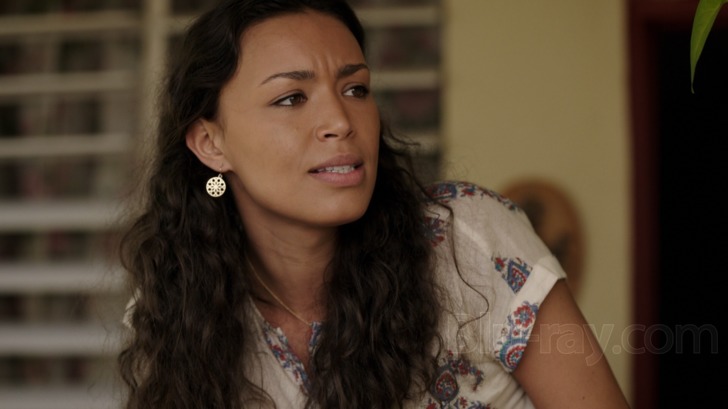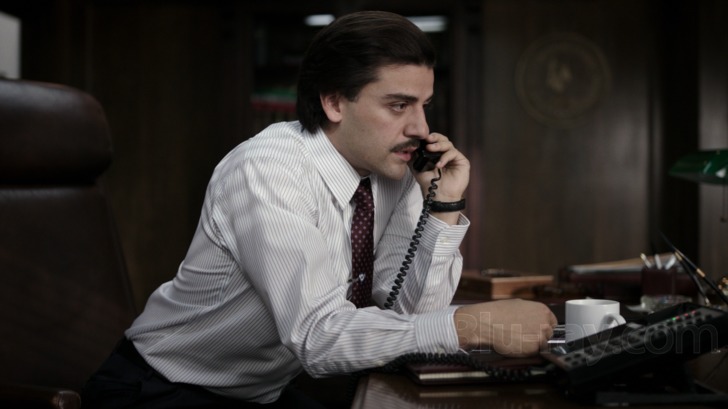Show Me a Hero Blu-ray Movie
HomeShow Me a Hero Blu-ray Movie 
Blu-ray + UV Digital CopyHBO | 2015 | 358 min | Rated TV-MA | Feb 02, 2016
Movie rating
7.5 | / 10 |
Blu-ray rating
| Users | 0.0 | |
| Reviewer | 4.0 | |
| Overall | 4.0 |
Overview
Show Me a Hero (2015)
Yonkers' Mayor Nick Wasicsko takes offices in 1987 and has to deal with the serious subject of the building of public housing in the white, middle class side of the town.
Starring: Oscar Isaac, Carla Quevedo, Peter Riegert, Jim Belushi, Alfred MolinaDirector: Paul Haggis
| Drama | 100% |
| History | 9% |
Specifications
Video
Video codec: MPEG-4 AVC
Video resolution: 1080p
Aspect ratio: 1.78:1
Original aspect ratio: 1.78:1
Audio
English: DTS-HD Master Audio 5.1
French: DTS 5.1
Spanish: DTS 2.0
Subtitles
English SDH, French, Spanish
Discs
50GB Blu-ray Disc
Two-disc set (2 BDs)
UV digital copy
Packaging
Slipcover in original pressing
Playback
Region A (B, C untested)
Review
Rating summary
| Movie | 4.0 | |
| Video | 4.0 | |
| Audio | 4.0 | |
| Extras | 1.0 | |
| Overall | 4.0 |
Show Me a Hero Blu-ray Movie Review
Reviewed by Jeffrey Kauffman February 5, 2016F. Scott Fitzgerald’s posthumously published journals provide the quote from which Show Me a Hero culls its title, namely, “Show me a hero and I’ll write you a tragedy”. But there are at least a couple of other notable Fitzgerald quotes which might be attached to various plot points that crop up in this “ripped from the headlines” miniseries from HBO, including “There are no second acts in American lives” and “Let me tell you about the very rich. They are different from you and me”. That last quote might be amended slightly to refer to either race or less wealthy folks than the “very rich”, but the sentiment would remain the same—Show Me a Hero is a story of a radical disconnect in American society, one fostered by the horrendous fact of slavery, its Jim Crow after effects, and the long slog toward true equality and the rejection of the “separate but equal” mentality that had been canon in the United States since the 1896 Plessy v. Ferguson ruling. When the various Brown v. Board of Education rulings (yes, there were two, at least in a manner of speaking) came along in the mid-fifties, it seemed that the United States might finally be marching (however slowly) toward true equality among the races, at least insofar as what “society” provided them, in this case access to public education. As Show Me a Hero makes distressingly clear, good intentions notwithstanding, there was still copious segregation in fact if not in “official policy” as late as the late eighties and early nineties with regard to public housing, in this particular case in Yonkers, New York. When a federal judge named Leonard Sand (Bob Balaban) issued a decree requiring Yonkers to build new housing in largely white neighborhoods which would become habitations for mostly black and other minority residents, a rousing chorus of “NIMBY” (not in my backyard) rose up, leading to years of political turmoil and devolving interpersonal relationships. At the center of Show Me a Hero’s sometimes wonky take on this convoluted subject is a young politico named Nick Wasicsko (Oscar Isaac, a Golden Globe winner for this performance), a former cop who had become a Yonkers City Councilman and who, as the miniseries’ first episode ends, is the unexpected winner of a mayoral election, becoming the youngest ever mayor of Yonkers (he was only 28 at the time), and evidently the youngest ever mayor of a major city in the United States.

In what some literary types might call a fairly ham handed piece of foreshadowing (especially for those who know the real life story), Nick is first seen in a cemetery, ultimately sidling up to what in a later vignette is revealed to be his father’s grave. The miniseries repeatedly returns to this setting, offering an initially somewhat bewildering locale where Nick seems either confused or, in one early sequence, somewhat bemused to be “talking” to his departed dad. The reason for this gambit is finally dealt with in an overt manner, but most will have guessed its import fairly early on.
Balancing these mostly interior moments are the more raucous, externally focused scenes which offer a nice accounting of the often fractious environment of the Yonkers City Council. The teleplay by David Simon and William F. Zorzi (both of whom also worked on The Wire: The Complete Series) perhaps tends to paint in fairly broad brush strokes, but quickly and efficiently offers portraits of several larger than life characters, including longtime mayor Angelo R. Martinelli (Jim Belushi), an old school politico who’s been in office for over a decade and a half. Also on hand is toothpick munching councilman Hank Spallone (Alfred Molina), a vitriolic guy who is adamantly opposed to the federally mandated desegregation order. Less felicitous, at least in the early going, are several introductions of less fortunate characters, a coterie of African Americans who are in one way or the other consigned to lives of lack, often including public housing which is in quite shockingly bad shape.
When Nick is approached by a party boss to consider running against Martinelli, he’s initially thrown for a loop, but ultimately agrees, becoming the unlikely winner when the increasing uproar over the planned public housing makes Martinelli a lightning rod. Show Me a Hero perhaps skirts that second part of Fitzgerald’s formulation (“and I’ll write you a tragedy”) by making the political realities of the time clear. While Nick initially ran on a staunch anti-integration platform, he’s soon made aware that there really is no legal recourse, and so he kind of unwillingly becomes a champion of going ahead with the plan. Interestingly, Nick’s relatively brief political career only fills up the first three episodes or so of the miniseries, leaving the second half of the show tending to focus on the continuing efforts to stall if not prevent the housing complexes being built, and at least occasionally shunting Nick off to the sidelines as a result, since he’s really no longer directly involved. This is, however, where some patience with regard to several of the black characters introduced earlier finally begins to reap some dramatic dividends, as various story arcs are folded into the ongoing drama once it’s clear that the new public housing is indeed going to be built.
The “actual” tragedy, as well as that other Fitzgerald quote about the lack of second acts in American life, unfold as the miniseries moves toward an at least slightly perplexing conclusion. The sociopolitical aspects of this story are brilliantly depicted by Simon and Zorzi, as well as by director Paul Haggis (Crash), but the personal element with regard to Nick is often frustratingly absent, seeming to lack context and perhaps therefore truly resonant meaning. Nick ends up looking like a cog chewed up by the very machine he wanted so badly to be part of, but it’s never really clear exactly why his reactions are what they end up being. Despite that lack of motivational clarity, Isaac does a fantastic job bringing a kind of hounded Everyman ambience to the role. The supporting cast, which is relatively huge, offers great roles for Catherine Keener (as one of the more contentious white neighbors fighting the housing scheme), Jon Bernthal (as an attorney working for the NAACP), Winona Ryder (doing a rather nice patois as a City Councilwoman), Carla Quevedo (as Nick's wife) and LaTanya Richardson Jackson (as a woman whose health problems intersect with the housing drama).
While almost picayune in its attention to details involving political machinations, Haggis chooses to elide emotional content at times by offering montages set to the music of Bruce Springsteen. It instantly creates an awareness of a kind of blue collar, working class consciousness, but it seems a bit odd at times, what with Springsteen being (not to state the obvious) white and (perhaps a bit more tangentially) tending to be more associated with New Jersey than Yonkers. Still, the miniseries does manage to work up considerable emotional heft by its endgame, offering a bittersweet lesson both in putative progress and the sometimes inescapable feeling that the more things ostensibly change, the more they remain the same.
Show Me a Hero Blu-ray Movie, Video Quality 

Show Me a Hero is presented on Blu-ray courtesy of HBO with an AVC encoded 1080p transfer in 1.78:1. The IMDb lists this as having been shot with the Arri Alexa, and while the miniseries doesn't really offer much in the way of visual "wow", there's a commendable sharpness and detail to a lot of this presentation, especially when Haggis and cinematographer Andrij Parekh indulge in extreme close-ups (see screenshot 1). A lot of the film takes place in brownish interiors like the Council chambers or the Judge's chambers, and so the palette tends to assume an almost monochromatic mien at times. Something that's quite interesting to pay attention to (for those who like the technical side of things) is how often Haggis and Parekh pull focus variously within the frame to establish "where to look". Therefore, a character deep in the frame may initially be out of focus, but will suddenly become the literal focal point as he or she begins to speak. This stylistic choice, which will become more and more evident for those attuned to such matters, means that occasionally things can look slightly soft, if only for a moment, as focal parameters change. Some of the relatively few exterior scenes boast decent depth of field, and the palette tends to pop a bit more in these sequences as well. Contrast is generally stable (I personally could have stood a bit more definition in some of those shrouded Council Chamber scenes). There are no issues with image instability or compression anomalies.
Show Me a Hero Blu-ray Movie, Audio Quality 

Show Me a Hero's lossless DTS-HD Master Audio 5.1 track gets the chance to stretch its sonic surround wings when the Springsteen montages are on display, but even in nonmusical sequences, there's often good immersion courtesy of busy (sometimes frenetic) environments like the increasingly contentious City Council meetings. Quieter sequences like those in the cemetery will still provide occasional if sometimes subtle discrete placement of ambient environmental effects. Because of the almost Howard Hawksian tendency to have dialogue overlap in some of those noisy council sequences, prioritization is sometimes just slightly akimbo, but in more traditional dialogue scenes there are no issues whatsoever.
Show Me a Hero Blu-ray Movie, Special Features and Extras 

Disc One
- Trailer (1080i; 1:44)
- Making Show Me a Hero (1080p; 6:21) is a pretty lightweight EPK that at least offers some decent behind the scenes footage and a smattering of brief interview snippets.
Show Me a Hero Blu-ray Movie, Overall Score and Recommendation 

I'm not quite sure that Nick Wasicsko qualifies as a "tragic hero", at least not in the traditional sense. And in fact the miniseries might have achieved more emotional resonance by focusing as much on some of the ostensible supporting characters, notably a couple of the black women in the "projects", as it ends up focusing on Nick. Still, this is a fascinating tour through a really disturbing era of "social justice", a time when even bulwarks like the NAACP were seemingly too sick of the fight to want to continue. While the miniseries perhaps doesn't offer enough emotional context for certain changes in Nick's character and/or responses along the way, the overall recreation of this unsettling situation is often brilliantly depicted, albeit in an often discomfiting manner. Isaac is top notch in a somewhat difficult role, and the large supporting cast is similarly effective. Technical merits are fine, and even with a pretty slight supplemental package Show Me a Hero comes Highly recommended.
Similar titles
Similar titles you might also like

The Other Woman
Love and Other Impossible Pursuits
2009

Mammoth
2009

If Beale Street Could Talk
2018

First Reformed
2017

Do the Right Thing 4K
1989

Chernobyl
2019

Invictus
2009

Anonymous
2011

Wonder Wheel
2017

I, Daniel Blake
2016

Still Alice
2014

Hurry Sundown
1967

Shadows
1958

Way Down East
1920

The Ides of March
2011

Scent of a Woman
1992

Men of Honor
2000

Selma
2014

Mad Men: The Complete Collection
2007-2015

Killing Kennedy
2013
